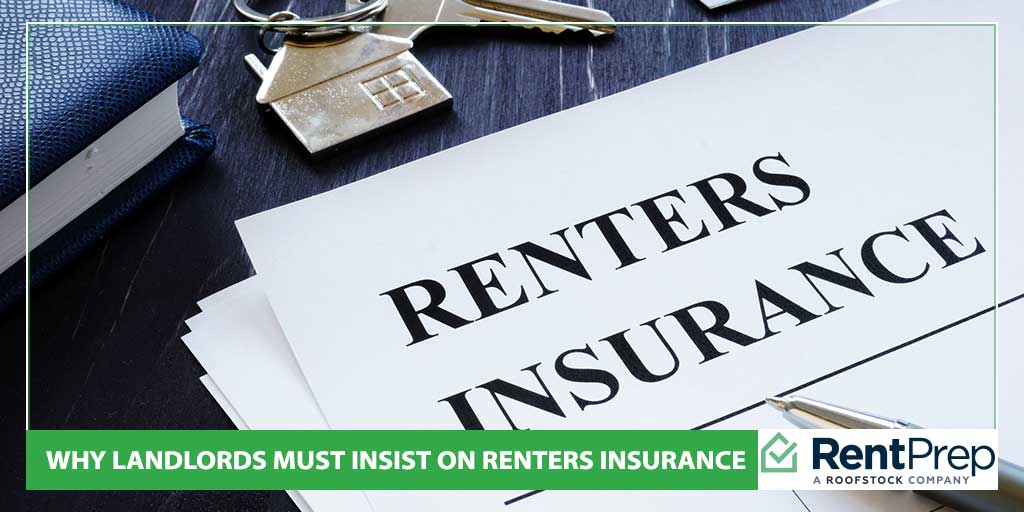
Landlords can set up requirements for tenants to follow in the lease agreement, and including a clause that requires them to carry renters insurance is growing increasingly common. Renters insurance policies cover the tenant and their guests and fill the gaps where the landlord’s property insurance does not cover. Such policies are not expensive, but they can make things much easier on both landlords and tenants when they are in place as part of a successful tenancy.
The worst landlord/tenant conflicts usually have to do with money and disagreements about who needs to pay for what. Many tenants don’t know that a landlord’s homeowner insurance only covers damage and issues with the property itself, not the possessions inside. So, if there is a flooded basement and the tenant’s belongings get damaged, they may not understand why the landlord’s insurance simply won’t compensate them for their loss. Getting everyone on the same page with insurance coverage is a fine way to start a landlord-tenant relationship.
5 Reasons To Insist On Renters Insurance
 When landlords are interviewing potential tenants about signing a lease, it’s a great time to bring up renters insurance. Landlords should require either proof of current coverage or require tenants to show proof within a set time period. More and more, landlords are making it mandatory before the applicants sign the lease agreement. Not only is this legal, it’s good protection for both tenants and landlords.
When landlords are interviewing potential tenants about signing a lease, it’s a great time to bring up renters insurance. Landlords should require either proof of current coverage or require tenants to show proof within a set time period. More and more, landlords are making it mandatory before the applicants sign the lease agreement. Not only is this legal, it’s good protection for both tenants and landlords.
Here are the top 5 reasons why landlords should insist that their tenants carry renters insurance and make it a condition of the lease agreement:
- Protect Personal Property: If the tenant experiences any kind of loss of personal property, through an accident at the rental home, the insurance policy will compensate them for the loss. Landlords won’t have to get drawn in to a conflict about whether or not they are responsible.
- Damage or Injury for Guests: If the tenant has guests over and they suffer property damage or injury, the renters insurance will provide that compensation. This will often alleviate the injured party from seeking out landlord liability as well.
- Theft Protection: Not only does renters insurance protect a tenant’s personal property in the event of theft, it covers their possessions that aren’t even in the rental home. For example, if something valuable is stolen from their vehicle, it is covered by the insurance.
- Temporary Expenses: If something should happen to the property that makes it uninhabitable for a while, such as a fire or weather-related damage, renters insurance will cover those temporary living expenses until the rental property becomes habitable again.
- Cooperation: If a tenant is familiar with how renters insurance works and either already has a policy or is willing to get one, it can signal that the tenant is the type that is cooperative, compliant and will therefore make a better tenant than one that fights it every step of the way.
It’s helpful for landlords to hand out brochures of nearby insurance agents to applicants that don’t have renters insurance yet so they can get some coverage lined up as soon as possible. With all the possibilities out there of what can go wrong, it only makes sense to insist on renters insurance for tenants.
Adding a Renters Insurance Clause to the Lease
Landlords that don’t already insist on renters insurance may be a little unsure about how to begin incorporating such a policy. The most obvious way is to include a clause into a new lease when the tenant is either renewing or is signing for the first time. It’s important to discuss each clause of the lease with the tenant or applicant, and the section about obtaining renters insurance is no different.
Landlords can also put together an addendum with a notice that starting at a certain month, all tenants will be required to carry a renters insurance policy. Of course, landlords should give a generous amount of time for this to be enacted and enforced as any change in a tenant’s budget or their spending is likely to be met with resistance if done too quickly. If the tenant’s lease renewal is in a few months, it is usually better to wait until then, for example.
Here is an example of a clause that incorporates renters insurance:
“The tenant, _____________________, understand that the owner’s property insurance (fire, hazard, and liability coverage for injury or damage), does not include or extend to the tenant or guests. Therefore, the owner requires that the tenant obtain their own renters insurance coverage against all risk to personal harm and property damage. The tenant’s insurance policy needs to include liability insurance. The tenant must also show the owner written proof of insurance coverage annually.”
Of course, landlords can consult with a landlord/tenant attorney to receive additional help on writing up a lease agreement, including clauses about renters insurance.
It’s also a good idea for landlords to require that they be named as the “additional insured” additional insured on the tenant’s renters policy. This means that the landlord will be notified if the insurance policy is ever cancelled for any reason, such as non-payment. Unfortunately, some tenants may sign up for a renters insurance policy just to get into a rental property and then promptly cancel it. With the landlord listed on the policy this way, they both remain protected or the landlord has a reason to evict the tenant for violation of the lease agreement.
In the end, tenants that have adequate insurance coverage will be grateful when and if something happens, and they may even thank their landlords for insisting on obtaining a policy.
How much renters insurance should a landlord require?
The maximum amount of coverage a landlord requires will depend on the state the rental resides in. For instance, in Oregon, a landlord can only require up to $100,000 in coverage. Be sure to check your state laws to see if there is any maximum limits on how much renters insurance a landlord can require.

